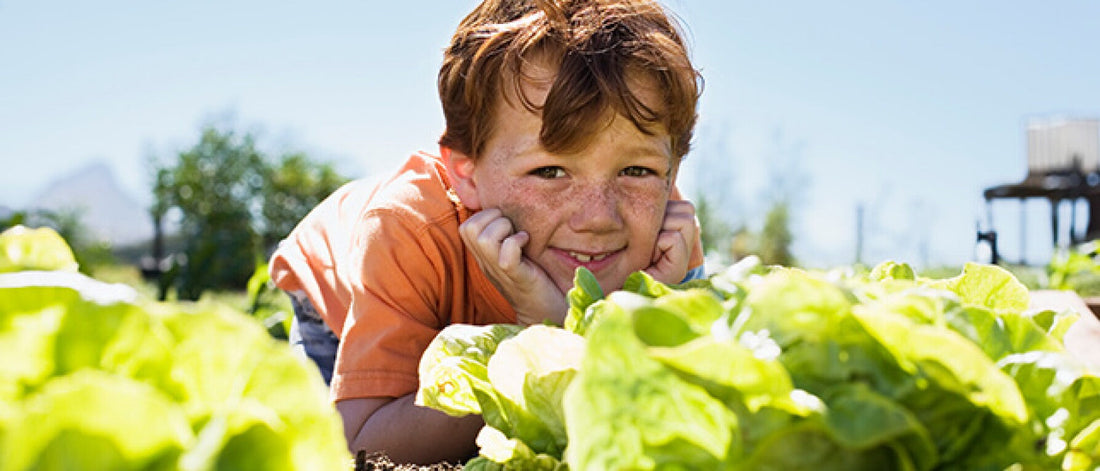Growing your own vegetables is one way to ensure that you’re eating fresh organic, pesticide-free food. But gardening doesn’t just provide nourishing foods for your body; it’s also an activity that feeds your mind.
Gardening can increase your awareness and help you become more attuned to the world around you.
Before you dive in, consider what plot of land you intend to use. Don’t worry if you live in an apartment or don’t have access to a garden plot. Herb gardens take up little space and can be cultivated indoors. If you have a deck, patio, or balcony, you can use this room to for smaller gardens and plants. There are even small kits that can be purchased to grow herbs right in your kitchen or on a windowsill.
Here are a few simple tips to help you get started with a new garden:
Be respectful of your space and be thoughtful about how you use it. You want to avoid growing food that you don’t eat that often. If you don’t eat a lot of squash, you won’t want to grow a squash plant. These, like other crops, produce a lot if treated right; do your research on what grows best by region and season and choose wisely.
Consider how to use your garden to help with your Ayurvedic health regimen. Certain herbs are medically beneficial and manageable even for a novice. Lavender, basil, cilantro, feverfew, St. John’s wort, oregano, mint, and rosemary are just a few that are easy to grow. Depending on where you live and the time you are able to dedicate to gardening, you might be able to grow a whole organic pharmacy right in your backyard. Feverfew is used to help household headaches and lavender is a sleep aid. By doing some research on which herbs are balancing to the specific doshas, you can give yourself a little variety and use as needed.
One of the best ways to ensure that your plants are well taken care of is to develop a routine around your garden care. If you learn to do a little every day, paying special attention to the essentials of water, soil, and sun, you’ll do fine.
Remember nature does most of the work anyway. Just flow with it and try to commune with the miracle that you are participating in. Try watering in the evening right before sunset or in the cool of the morning. This will give you the opportunity to take care of your plants and experience a meditative time of day outside in nature. You may come to treasure the tranquility and make it part of your own daily renewal. Whatever routine you build, make sure it’s easily incorporated with your daily routine.
In Ayurveda, we are encouraged to appreciate our food and practice gratitude for the blessings of nourishment that we receive through our diets. Gardening can help deepen your relationship to the meals you prepare.
Spending time in vegetation is balancing and Prana-enhancing. By using time in the garden as a way of attuning with nature, you can tap into the healing properties of the elements. There’s a lot going on when you’re cultivating a garden. You’re participating in nature’s miracle of life and benefiting from it directly. You’re building a subtle awareness of cause and effect, or Karma. You’re unifying your consciousness with your food and environment. And at the very least, you’re giving time and attention to something that will benefit you and your family. These all carry spiritual significances if you desire to experience them. Gardening with awareness can bring about inner awakenings and many gardeners will attest to this, regardless of spiritual practice.
Remember that nature is doing the real work, so let its intelligence work through you as well. The whole experience of gardening can be transcendent and beneficial when done from a certain perspective. If nothing else, you’ll be giving yourself some fresh, healthy food to sample this year.
Gardening can increase your awareness and help you become more attuned to the world around you.
Before you dive in, consider what plot of land you intend to use. Don’t worry if you live in an apartment or don’t have access to a garden plot. Herb gardens take up little space and can be cultivated indoors. If you have a deck, patio, or balcony, you can use this room to for smaller gardens and plants. There are even small kits that can be purchased to grow herbs right in your kitchen or on a windowsill.
Here are a few simple tips to help you get started with a new garden:
Decide What to Plant
There’s a world of possibility when it comes to growing your own food. Some people start a garden with basics like potatoes, corn, tomatoes, and cucumbers. Most of these staples grow easily if they’re in the right setting; and you can save you a lot of money at the grocery store by having your own. If you have a good season, be prepared to get a lot of produce.Be respectful of your space and be thoughtful about how you use it. You want to avoid growing food that you don’t eat that often. If you don’t eat a lot of squash, you won’t want to grow a squash plant. These, like other crops, produce a lot if treated right; do your research on what grows best by region and season and choose wisely.
Research Your Foods
Educate yourself as much as possible on the foods that you have decided to grow. Sometimes minding details, such as how much space is needed between plants, sunlight, and drainage can make a huge difference on your crop yield.Consider how to use your garden to help with your Ayurvedic health regimen. Certain herbs are medically beneficial and manageable even for a novice. Lavender, basil, cilantro, feverfew, St. John’s wort, oregano, mint, and rosemary are just a few that are easy to grow. Depending on where you live and the time you are able to dedicate to gardening, you might be able to grow a whole organic pharmacy right in your backyard. Feverfew is used to help household headaches and lavender is a sleep aid. By doing some research on which herbs are balancing to the specific doshas, you can give yourself a little variety and use as needed.
Create and Follow a Care Routine
Many people who start gardening, lose interest once they realize how much work and planning it takes to make it successful. If you talk to experienced gardeners, you may hear horror stories about weeds, pests, heat strokes, mosquitos, and water bills. Take all of these tales in stride. While it takes a fair share of effort to properly cultivate a garden, many who continue to garden year after year have come to love it. These challenges only make gardening more interesting.One of the best ways to ensure that your plants are well taken care of is to develop a routine around your garden care. If you learn to do a little every day, paying special attention to the essentials of water, soil, and sun, you’ll do fine.
Remember nature does most of the work anyway. Just flow with it and try to commune with the miracle that you are participating in. Try watering in the evening right before sunset or in the cool of the morning. This will give you the opportunity to take care of your plants and experience a meditative time of day outside in nature. You may come to treasure the tranquility and make it part of your own daily renewal. Whatever routine you build, make sure it’s easily incorporated with your daily routine.
Pay Attention to Your Garden
Spend a little time every day appreciating the growth as it is happening. There’s something transcendent about participating in this act of nature. You can come to develop a relationship with your garden, which can be an awesome experience.In Ayurveda, we are encouraged to appreciate our food and practice gratitude for the blessings of nourishment that we receive through our diets. Gardening can help deepen your relationship to the meals you prepare.
Spending time in vegetation is balancing and Prana-enhancing. By using time in the garden as a way of attuning with nature, you can tap into the healing properties of the elements. There’s a lot going on when you’re cultivating a garden. You’re participating in nature’s miracle of life and benefiting from it directly. You’re building a subtle awareness of cause and effect, or Karma. You’re unifying your consciousness with your food and environment. And at the very least, you’re giving time and attention to something that will benefit you and your family. These all carry spiritual significances if you desire to experience them. Gardening with awareness can bring about inner awakenings and many gardeners will attest to this, regardless of spiritual practice.
Remember that nature is doing the real work, so let its intelligence work through you as well. The whole experience of gardening can be transcendent and beneficial when done from a certain perspective. If nothing else, you’ll be giving yourself some fresh, healthy food to sample this year.






















